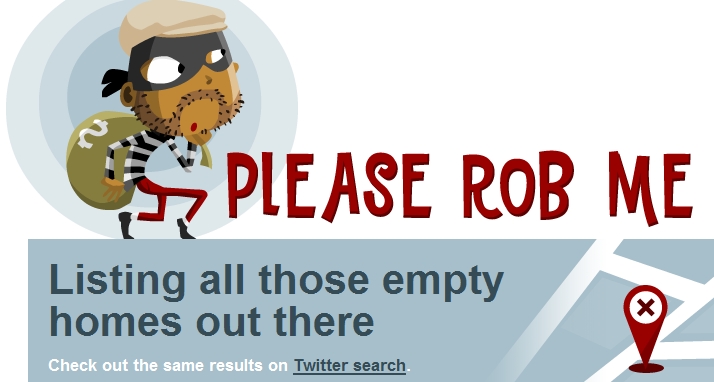Perhaps by now you’re heard of the “Please Rob Me” site that highlights those on Twitter disclosing that they’re away from their homes.
While the site is kind of funny, it draws attention to a serious point — disclosure of detailed personal information, including your precise physical location, will lead to crime. Notice I didn’t say MIGHT lead to crime. It is inevitable that the bad guys are going to figure this stuff out. They always do.
Last week I saw my first tweet that actually had a map attached to it. The stalkers can not only find you, the technology is telling them how to get to you. Or your empty house. Or your kids.
I’m particularly concerned by this emerging generation who is de-sensitized to what they’re sharing about themselves. They’ve been conditioned to put everything out there all the time, so why not tell everyone where you are, too? They’re actively and willingly teaching The Machine their personal habits, behavior patterns and hang-outs, just so they can be named “mayor” of a location on Foursquare or receive a free latte at Starbucks.
Where corruption can occur, corruption will occur. It is only a matter of time before a tragic crime draws attention to these serious issues and people start taking action, perhaps even legislation. Let’s not wait for that, OK?
As an individual, and especially as a parent, I think we need to draw the line on certain social web behaviors.
- Actively teach your kids to be net-savvy. Instill a healthy dose of paranoia into their mindset. Teach them about privacy settings and being Internet “street smart.”
- Take a view that Internet access is a privilege, not a right. Set clear expectations and limits. If a child does something to endanger themselves on the Internet, there should be consequences, just as if they had wrecked a car or set a fire in the kitchen.
- Personally, I would forbid my kids from using Foursquare or any technology that reveals their personal location at a point in time.
- Be involved in what they’re doing. Know enough about the technology to ask the right questions. Look at who has friended them and what those people are saying to your kids. Until you are convinced they can demonstrate mature judgment, I don’t think kids have a right to Internet privacy.
A man told a story yesterday on a news report on Internet safety that as a precaution, he follows every one of his young son’s Facebook friends. “I’m a 39 year old man,” he said. “And these kids automatically follow me back even when they don’t know who I am. And their parents never question it either. It just shows me how dangerous this could be for young kids.”
If you’re a parent, deal with this. Don’t ignore the issue or avoid conflict with your kids over the family “privacy” battle. Will you leave a comment and let me know what you think on this issue?



